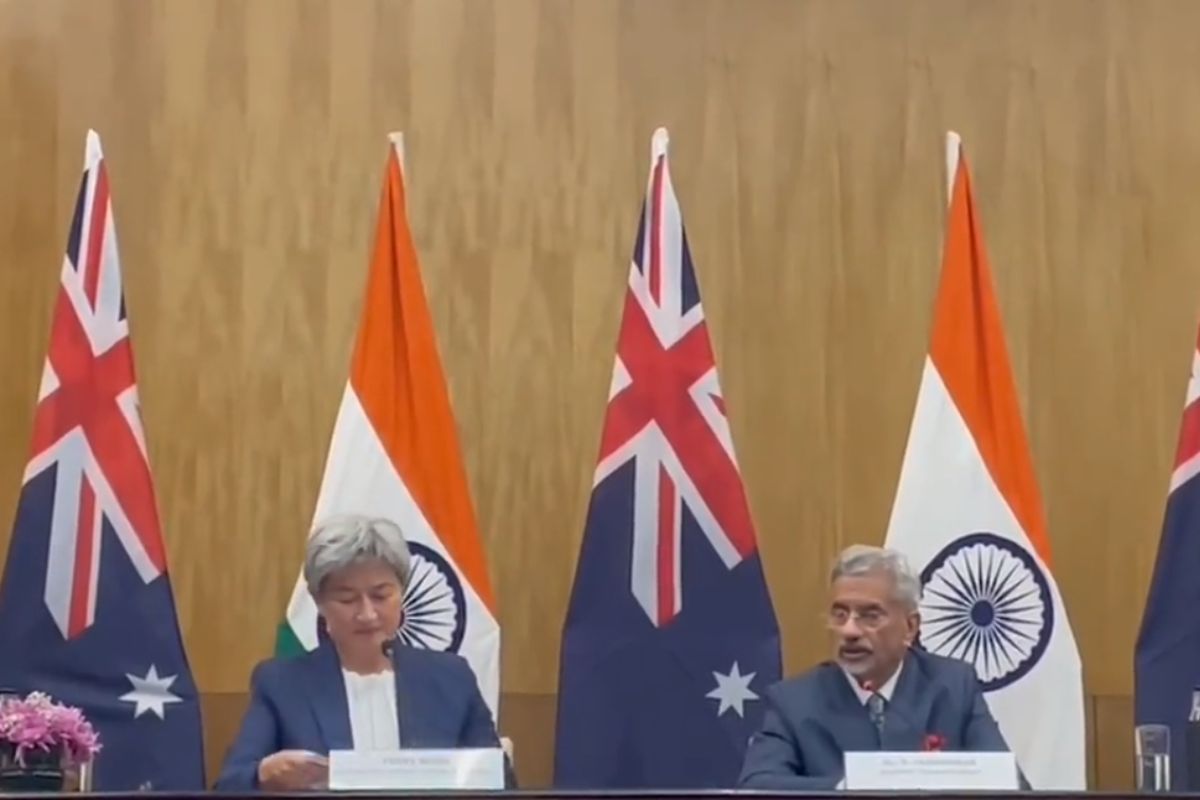NEW DELHI: The 14th Foreign Ministers’ Framework Dialogue concluded between India and Australia on November 21 in New Delhi. India’s Foreign Ministers Dr. S Jaishankar and his Australian counterpart Penny Wong discussed various critical subjects including the Indo-Pacific, Quad Alliance, Israel-Hamas tensions, and Khalistani radicalisation in Canada.
The discussion emphasised the call for a ‘free, open, inclusive, stable, rules-based, and prosperous’ Indo-Pacific region amidst China’s rising influence. India is gearing up to host the Quad Leaders’ Summit in 2024, fostering continued dialogue and collaboration among major democracies- Australia, India, Japan, and the United States.
Dr. Jaishankar raised concerns about India-Canada diplomatic strains regarding allegations made by Justin Trudeau against India in the Hardeep Singh Nijjar case. He highlighted India’s concerns about extremism and radicalism in Canada, seeking Australia’s understanding on the issue.
FLASH: Minister of external affairs, Dr S Jaishankar, elaborates on India’s stance in the #IsraelPalestineWar and says that India observes the October 7 attacks as an act of terrorism by the #Hamas while also observing the humanitarian crisis in #Gaza.
Reports @urvashikhona pic.twitter.com/CIwhBxSak0
— The New Indian (@TheNewIndian_in) November 21, 2023
He said, “Yes, I spoke about India and Canada to Minister Wong. Australia has a good, strong, close relationship with both of us. So I felt it was important that Australia get our perspective on the issue, and you know that from our point of view, the key issue is really the space which has been given to extremism and radicalism in Canada. I spoke to her about our perspective, and she did listen to me very carefully.” Wong meanwhile didn’t respond much to the question.
Responding to multiple questions on Quad and China, Penny Wong said, “We do require one of the important components or aspects of our partnership with India is obviously our partnership in the context of the Quad. We look forward to the Quad’s continued contribution to the region we want to live in and to the betterment of the peoples of the region.”
Wong raised concerns about recent interactions with the PLA Navy. She said “The first is that the safety and wellbeing of Australian Defence personnel is our utmost priority. The second point I’d make is, to again reiterate that we have raised our serious concerns with the Chinese authorities following what we regard as unsafe and unprofessional interaction with the PLA Navy destroyer.
She reiterated the necessity for all nations to operate their militaries safely and professionally in the Indo-Pacific. Finance minister said, “Australia’s principal position is that we expect all countries, including ourselves, to operate militaries in a safe and professional manner. We use the phrase peaceful, stable, and prosperous Indo-Pacific. China has a slightly different formulation, but they essentially have the same objective. We also recognize China’s importance and place in the region and globally, and we continue to engage with China.”
The two countries also advocated for a two-state solution to resolve the Israel-Palestine conflict. Dr. Jaishankar emphasised addressing terrorism, humanitarian crises in Gaza, and the rights of Palestinians, while Wong underscored the need for a political solution for lasting peace.
FLASH : EAM S.Jaishankar on India – Canada relations
“Canada has provided space for extremism and radicalism,” – EAM S. Jaishankar,during Press Briefing by EAM and FM of Australia foreign affairs minister Penny Wong on India.
“We discussed and spoke about the India-Canada… pic.twitter.com/VROFZwzykV
— The New Indian (@TheNewIndian_in) November 21, 2023
Jaishankar stated, “There are different aspects of the very complex and challenging situation that we face today. One is terrorism, which happened on October 7th. And we think, nationally as well as the international community, that we should never compromise terrorism. We also have the hostages issue. There’s a second set of issues, and this is the humanitarian crisis that we see in Gaza today. The need for humanitarian assistance, which is very urgent, and the observance of international humanitarian law there. And the third set of issues relate to the rights and the future of the Palestinians.”
“The solution, in our view, and in the view of many countries in the world, can only come from a two-state solution. So today, I would say the consideration of the situation in West Asia is, if you have these three broad sets of issues, we have to find a way by which all of them are addressed. You know, when we hear one asserted at the expense of another, that is not really going to lead to a way forward,” he added. Wong echoed similar sentiments and highlighted the dire situation in Gaza, while condemning the ‘act of terrorism’ committed by Hamas.
The India-Australia 2+2 Foreign and Defence Ministerial Dialogue highlighted the strengthening ties between the two nations.









